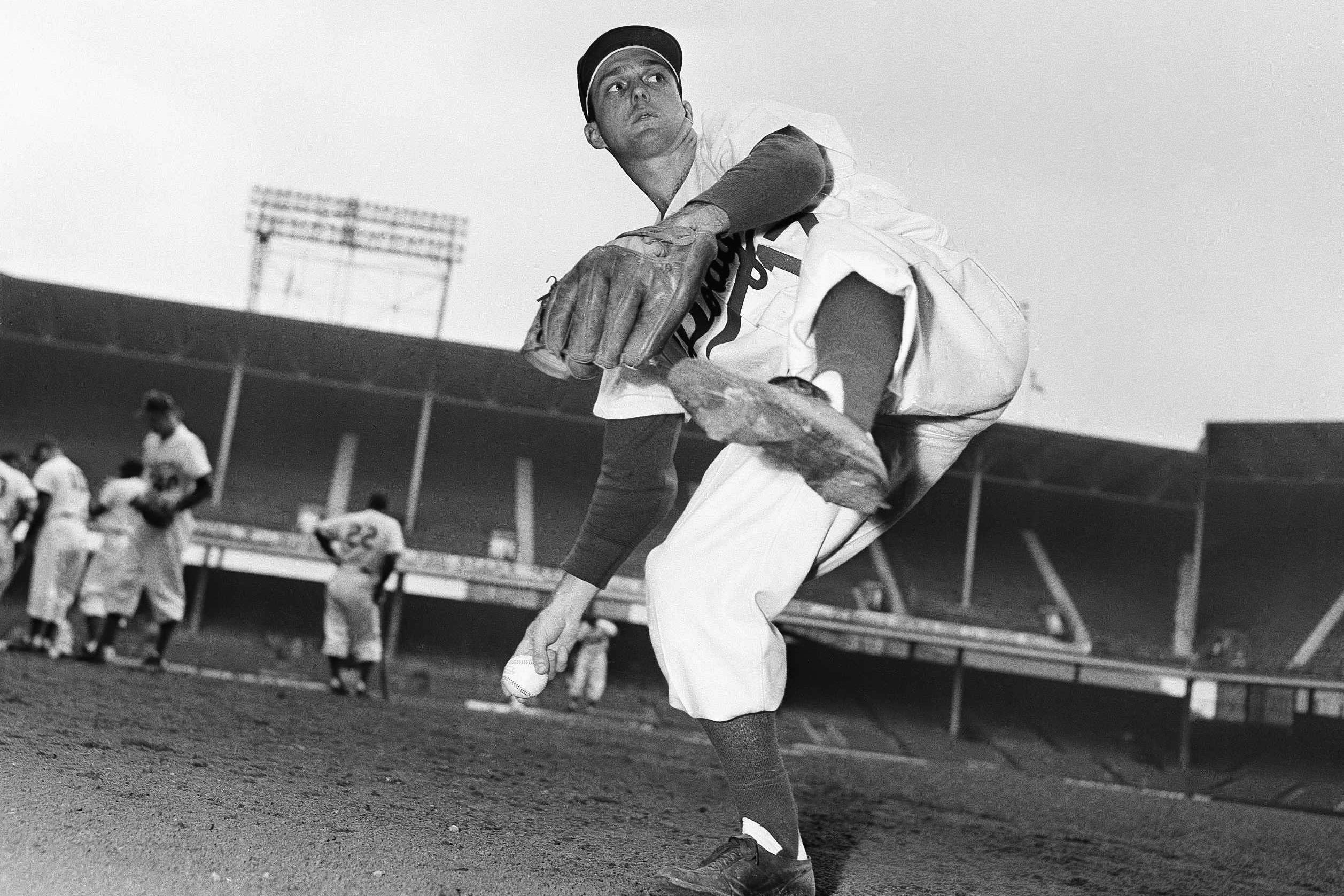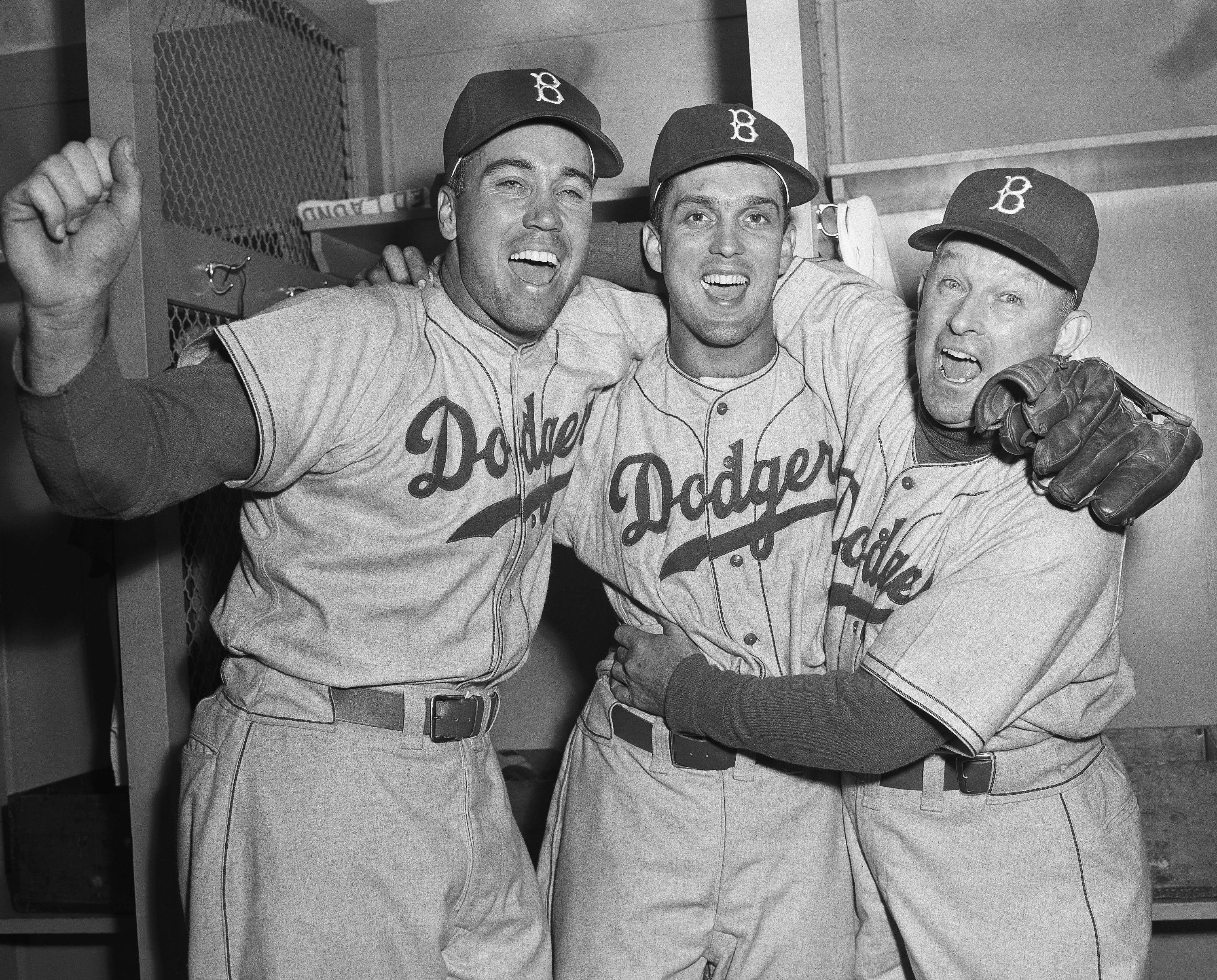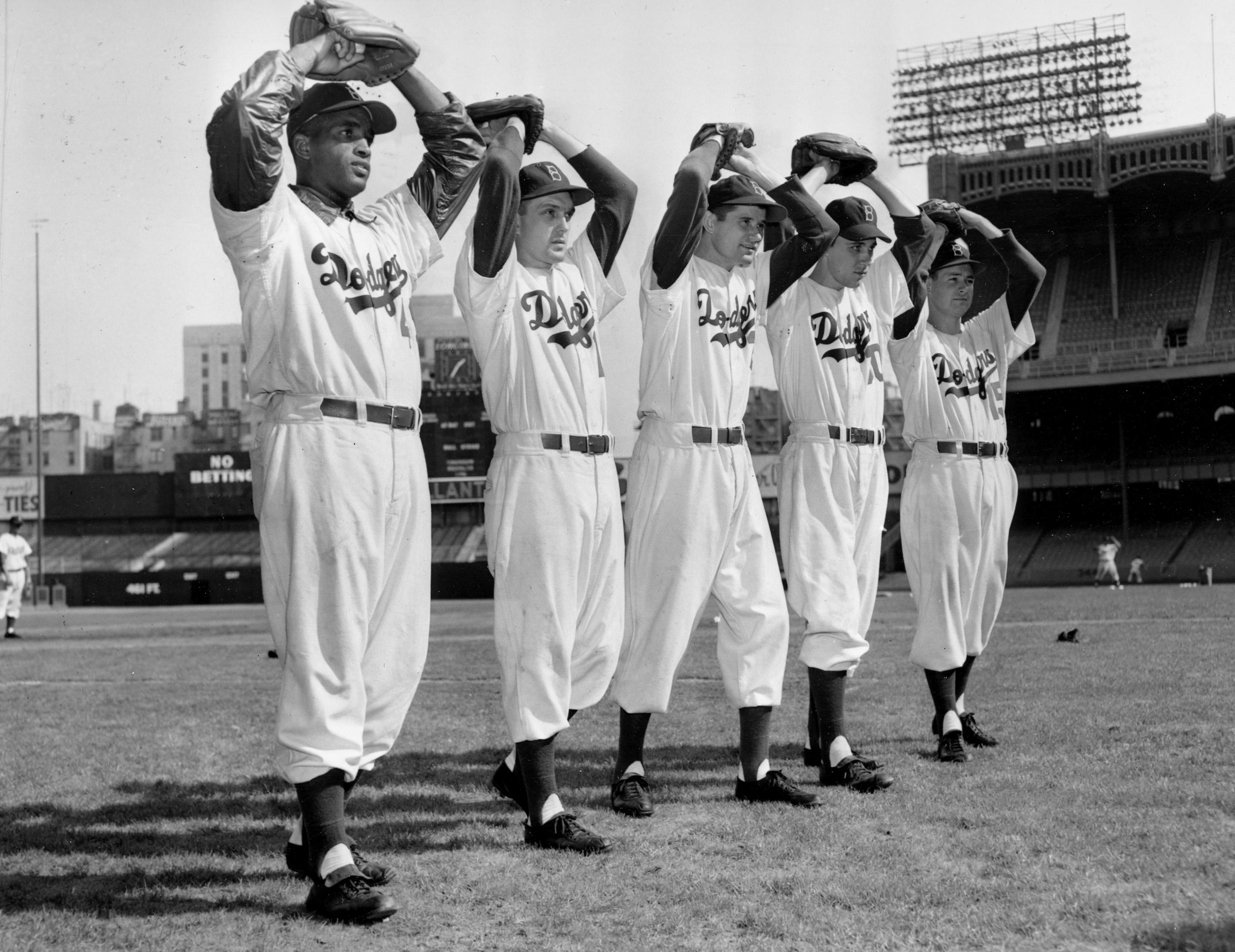
Carl Erskine, Dodgers pitcher and last of ‘Boys of Summer,’ dies at 97
Carl Erskine, a standout pitcher who was the last of the “Boys of Summer,” the celebrated Brooklyn Dodgers team of the 1940s and 1950s that broke baseball’s racial barrier with Jackie Robinson and became a National League power, died April 16 at a hospital in Anderson, Ind. He was 97.
The death was confirmed by Ted Green, a filmmaker who directed a 2022 documentary on Mr. Erskine, “The Best We’ve Got.” The cause was related to pneumonia, Green said.
Mr. Erskine became an anchor of the Brooklyn pitching staff at a time when New York was the hub of the baseball universe, with three major league teams. The Dodgers overcame a reputation as lovable losers to reach the World Series six times in 10 years — always against their crosstown rivals, the New York Yankees.
The team was the pride of Brooklyn, but after the 1957 season, the Dodgers and New York Giants departed the city for the West Coast, leaving their fans with an enduring sense of loss. Writer Roger Kahn, who covered the Dodgers for the New York Herald Tribune in the early 1950s, sought to show how the spirit of Brooklyn was intertwined with the fortunes of Dodgers in his widely admired 1972 book, “The Boys of Summer.”
His heartfelt account portrayed the Dodgers and their vanished era in almost mythic terms. “In the dead sunlight of a forgotten spring,” he wrote, “the major leaguers were trim, graceful and effortless. They might even have been gods for these seemed true Olympians to a boy who wanted to become a man and who sensed that it was an exalted manly thing to catch a ball with one hand thrust across your body and make a crowd leap to its feet and cheer.”
Mr. Erskine, the last surviving player prominently featured in Kahn’s book, played alongside such Hall of Fame stars as outfielder Duke Snider, infielders Gil Hodges and Pee Wee Reese, catcher Roy Campanella and, of course, Robinson, an infielder who in 1947 became the major leagues’ first Black player of the 20th century. (A handful of Black men played in the 1870s and 1880s.) When Mr. Erskine joined the Dodgers in 1948, Robinson was the first player to shake his hand.
Mr. Erskine was not an intimidating figure, at 5-foot-10 and 165 pounds, but he had an excellent curveball and change-up and was a mainstay of a pitching staff that included Don Newcombe, Preacher Roe, Ralph Branca and Clem Labine. The young right-hander was dubbed, in exaggerated Brooklynese, “Oisk.”
During the first game he started in the majors, against the Chicago Cubs in 1948, Mr. Erskine tore a muscle in the back of his shoulder. In those days, medical treatment for injuries was rudimentary, and Mr. Erskine feared that if he complained, he would be labeled a “sore-armed pitcher” and would lose his spot on the roster. As a result, the injury plagued him throughout his 12-year career, and he often pitched in pain.
Mr. Erskine appeared in five World Series and had a dramatic 11-inning complete-game victory over the Yankees in 1952, but the Dodgers fell short of winning the title.

Brooklyn Dodger manager Charley Dressen, right, hugs his winning pitcher, Carl Erskine, after the Dodgers 6-5 win over the Yankees in the fifth game of World Series on Oct. 5, 1951. Duke Snider, who drove in the winning run, joined the celebration.
A year later, he had one of his best seasons, with a 20-6 record, as he helped lead the Dodgers to another National League pennant. He took the mound in the third game of the World Series, and through eight innings had recorded 12 strikeouts (including four by Mickey Mantle). In the Yankee dugout, veteran slugger Johnny Mize chided his teammates for swinging at Mr. Erskine’s sharply dropping overhand curveball.
“All afternoon I could hear him yelling at the Yankee hitters,” Mr. Erskine told Kahn in “The Boys of Summer.” “‘What are you doing, being suckers for that miserable bush curve?’”
Holding a 3-2 lead in the bottom of the ninth, Mr. Erskine struck out pinch hitter Don Bollweg. The next batter was another pinch hitter, Mize — who struck out. Mr. Erskine’s 14 strikeouts set a new World Series record, which was later broken by Sandy Koufax and Bob Gibson.
Despite Mr. Erskine’s efforts, the Yankees won the series. The Dodgers finally broke the spell in 1955, defeating the Yankees in seven games for the only World Series title in Brooklyn history. (Mr. Erskine started the fourth game, which the Dodgers won, but he did not figure in the decision.)
Throughout Mr. Erskine’s time in Brooklyn, the symbolic importance of Robinson made the Dodgers something of a public social experiment. Like many other institutions in American life, major league baseball had been exclusively White for decades. Years before the civil rights movement gained momentum, Brooklyn’s general manager, Branch Rickey, was determined to integrate the majors with Robinson, an Army veteran who had been a multisport star at UCLA.
Robinson and other Black players who later joined him in Brooklyn, including Campanella and Newcombe, were greeted with skepticism and hostility by other clubs and even some of their teammates. But Rickey held firm and built a winning team, with Robinson at its core.
“Everywhere,” Kahn wrote in “The Boys of Summer,” “men and women talked about the Jackie Robinson Dodgers, and as they talked they confronted themselves and American racism.”
Mr. Erskine was 21 when he first stepped into the Brooklyn clubhouse, but he was already a Navy veteran and had a little-known personal history that helped make him one of Robinson’s strongest allies on the team.
At one point, Mr. Erskine recalled in a 2022 interview with the Indianapolis Star, Robinson asked him, “Hey Erskine, how come you don’t have a problem with this Black and White thing?”
“I said, ‘Well, I grew up with Johnny Wilson.’”
Mr. Erskine spent his childhood in a mixed-race neighborhood in Anderson, Ind., and his best friend, Wilson, was Black. They went to the same schools, played on the same teams and ate meals at each other’s homes.
“With a background like that,” Mr. Erskine told Kahn, “the Robinson experience simply was no problem. It was really beautiful in a way.”
‘I saw a lynching rope’
Carl Daniel Erskine was born Dec. 13, 1926, in Anderson, a midsize city in central Indiana. His father owned a grocery store and later worked in a factory. His mother was a homemaker.
Mr. Erskine grew up imbued with his father’s love of baseball and his family’s strict Baptist values. When Carl was about 4, his father drove him to a neighboring town, where the previous day a White mob had pulled two Black prisoners from jail and hanged them. Parts of a noose still dangled from a tree limb.
“I saw a lynching rope before I was 10,” Mr. Erskine later recalled. The image was forever lodged in his memory.
Throughout his youth, he played on sports teams with Black and White athletes, most notably Wilson, who was named Indiana’s “Mr. Basketball” in high school. Nonetheless, Wilson was denied admission to Indiana University, which Mr. Erskine considered an injustice based on race. Wilson later played for the Harlem Globetrotters and coached basketball.

The Brooklyn Dodgers pitchers warm-up ahead of the World Series at Yankee Stadium on September 30, 1952. From left, Joe Black, Carl Erskine, Preacher Roe, Billy Loes and Johnny Rutherford.
In his early teens, Mr. Erskine was taught how to throw a curveball by his father, who once broke the family’s china cabinet while demonstrating the pitch. Young Carl’s large hands and supple wrist helped him put a tight spin on his curve, and he was noticed by a Brooklyn scout while still in high school.
After graduating, Mr. Erskine served in the Navy during World War II, based in Boston. He signed with the Dodgers in 1946 for a $3,500 bonus — more money than his father made in a year.
His contract was later voided because of a rule banning teams from signing players still on active military duty. After his discharge, Mr. Erskine was pursued by several teams, but he felt loyal to the Dodgers and signed a new contract for $5,000, in addition to his earlier bonus. After bouncing between Brooklyn and the minor leagues — with a stint playing winter ball in Cuba — he found a permanent spot in the Dodgers’ pitching rotation in 1950.
During an era when many ballplayers were hard-drinking and rowdy, Mr. Erskine was clean-living and refined. He recited poetry from memory, enjoyed classical music and, on road trips to other cities, liked to visit museums.
After the 1957 season, Dodgers owner Walter O’Malley moved the franchise to Los Angeles, becoming a villain in the eyes of Brooklyn fans. Mr. Erskine followed the team west and, in April 1958, threw the first pitch in a major league game played in Los Angeles.
The next season, Mr. Erskine retired at age 32 with a career record of 122-78 and a 4.00 earned run average. He was an All Star in 1954 and threw two no-hitters — against the Cubs in 1952 and against the Giants in 1956.
Mr. Erskine was planning to move to New York to work in marketing for a men’s clothing company. In 1960, he and his wife, Betty, had their fourth child, a boy named Jimmy who had Down syndrome.
“The assumption right in the beginning was, of course, you’re going to take him to some institution,” Mr. Erskine told the New York Times in 2023. “And Betty says, ‘No, no, he goes home with us.’”
Mr. Erskine turned down the New York job and moved with his family to Indiana, where he sold insurance, coached baseball at Anderson College (now a university) and eventually became the president of a local bank.
He became a volunteer with the Special Olympics at the request of Eunice Kennedy Shriver, who founded the program, and he helped run a youth baseball league whose guiding slogan was, “Everybody makes the team.”
When Robinson came to Indiana in the 1960s to offer his support for the youth league, he recalled the relationship that he and Mr. Erskine had as teammates, adding, “It’s a friendship that I’ll cherish, and I’ll always cherish, for as long as I can remember.” Robinson died in 1972 at age 53.
Mr. Erskine was lauded in his home state for leading efforts to improve the treatment of children and others with disabilities. The governor gave him the state’s highest civilian honor in 2010, and a documentary about his life, “The Best We’ve Got,” was released in 2022. In 2023, he received the National Baseball Hall of Fame’s Buck O’Neil Lifetime Achievement Award for his contributions to the game and to society.
Survivors include his wife since 1947, the former Betty Palmer; four children; and many grandchildren and great-grandchildren.
Over the years, Mr. Erskine grew accustomed to attending funerals and giving eulogies for his fellow Boys of Summer. One by one, they fell away until Mr. Erskine was the last one standing — the final Dodger to have seen action in the 1955 World Series, Brooklyn’s great moment of glory.
Former baseball commissioner Fay Vincent interviewed Mr. Erskine for his 2008 book, “We Would Have Played for Nothing.”
“Standing on the mound for that team,” Mr. Erskine told Vincent, “was just in itself the thrill of my life.”
News Related-
Russian court extends detention of Wall Street Journal reporter Gershkovich until end of January
-
Russian court extends detention of Wall Street Journal reporter Evan Gershkovich, arrested on espionage charges
-
Israel's economy recovered from previous wars with Hamas, but this one might go longer, hit harder
-
Stock market today: Asian shares mixed ahead of US consumer confidence and price data
-
EXCLUSIVE: ‘Sister Wives' star Christine Brown says her kids' happy marriages inspired her leave Kody Brown
-
NBA fans roast Clippers for losing to Nuggets without Jokic, Murray, Gordon
-
Panthers-Senators brawl ends in 10-minute penalty for all players on ice
-
CNBC Daily Open: Is record Black Friday sales spike a false dawn?
-
Freed Israeli hostage describes deteriorating conditions while being held by Hamas
-
High stakes and glitz mark the vote in Paris for the 2030 World Expo host
-
Biden’s unworkable nursing rule will harm seniors
-
Jalen Hurts: We did what we needed to do when it mattered the most
-
LeBron James takes NBA all-time minutes lead in career-worst loss
-
Vikings' Kevin O'Connell to evaluate Josh Dobbs, path forward at QB
